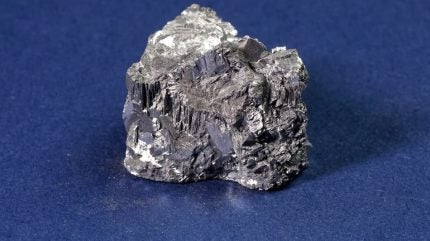
China’s most recent action to limit global shipments of critical minerals in the name of national security came on 14 August, when the country declared export restrictions on antimony.
Antimony is crucial for the defence industry, especially in armour-piercing ammunition, night vision goggles, infrared sensors, bullets and precision optics. The material is also used in the electronics industry, including semiconductors, cables, and batteries. China’s move to restrict antimony exports follows a series of export controls taken in 2023 involving graphite, germanium, gallium, and rare earth processing technologies.
The US relies on imports for 82% of its antimony demand, with China being the largest supplier at 63%. The US currently stockpiles only 1,100 tonnes (t) of antimony, although its consumption in 2023 was 23,000t.
In conversation with Gary Evans, co-CEO and board member of the US Antimony Corporation, Mining Technology discusses the impact of China’s antimony export restrictions on the US market.
Smruthi Nadig (SN): How does the US currently obtain antimony?
Gary Evans (GE): Our governments are getting a lot of antimony from China. China controls 55% of the world supply. More importantly, they control 70 plus % of the midstream, which is the flotation and antimony smelting. [China’s] announcement a few weeks ago…has created quite a quagmire in the world.
We are the only smelter in North America and now have a flotation facility that we leased about three weeks ago. We [can] take concentrate, or antimony that’s subpar, and bring it to our flotation facility, bring that concentrate level up to munitions grade – which is in our smelters about 70% – and make the finished [metal] product.
SN: What is the significance of antimony for the US?
GE: We’re using lots of munitions in our war. With the Ukrainian-Russian war, we’re helping supply Ukraine with military goods, and with the Israeli-Hamas situation, we’re helping Israel. We used a lot of our [antimony] inventory and need to replenish it, so we’re in a fairly tight spot. There’s a silver lining here…It’s fixable, but it’s going to take a little time.
SN: How will China’s export ban on antimony affect the US market?
GE: We’re in a unique position [to be] able to fill this void for a while. We believe that everybody around the world has got antimony and is turning over rocks, trying to figure out what they can do with it.
We’ve been fielding calls from at least a dozen countries… We’re having those parties send us samples [that] we’re testing in Thompson Falls, Montana, to see if [they] can meet the standards we need to process. And we’re beginning to find some material….We’re hopeful that we can begin to fill the void. That’s the plan.
SN: Did you expect the ban? How has the US market reacted to the export restrictions?
GE: If you look at what China has been doing for the last 15 years, going around the world, buying up antimony mines, and taking control of this mineral, we should have seen it coming. Because China had so much control of antimony worldwide, they drove the prices down, [which], in effect, shut down most antimony mines in the US, Canada, and other places around the world.
SN: How does the US plan to secure its antimony supply chain?
GE: That’s what we’re trying to help solve. There is a company that the government has helped fund called Perpetua Resources, which has received over $50 million [in] grants. There is also a gold mine in Idaho that has a lot of antimony associated with it. So that supply [will] be available, but it may be [several] years away.
There’s a void now, and we can help fill that void with these supplies that we’re finding around the world. I’ll know a whole lot more in 30 to 60 days. But right now, we’re making progress and [should] be able to help.
SN: Will domestic antimony production start happening in the US again?
GE: We have a mine in Thompson Falls, Montana, which is near adjacent to our smelter. It was shut down in 1983. We’re combing our records to determine whether it makes sense to open that mine back up. At the request of the Department of Defense, we have a laundry list of ideas, which includes new mining opportunities we have in Canada and Alaska, as well as opening [of] the Thompson Falls mine.
There will probably be some inquiries to the government to reopen some of these mines. They were shut down for two reasons. One was economics. China drove the price down significantly, and [secondly] the US Environmental Protection Agency (EPA). [There’s often] arsenic associated with antimony, and the EPA shut down made it just too difficult to operate.
SN: Are there any emerging alternatives for the US?
GE: The government still has an [antimony] stockpile. [However], the problem is that the supply has been cut significantly because of China. So, everybody’s scrambling to replace that supply. But right now, I’m not aware of a replacement for antimony. I know there’s been some discussion about synthetics, but at this point, we need the hard-rock metal.
SN: Do you see the US competing in the supply chain with antimony production?
GE: If we’re a competitor, it will be for our own uses. We’d use it for our needs and fill the gap with foreign supplies. I don’t see us as exporters of antimony.



